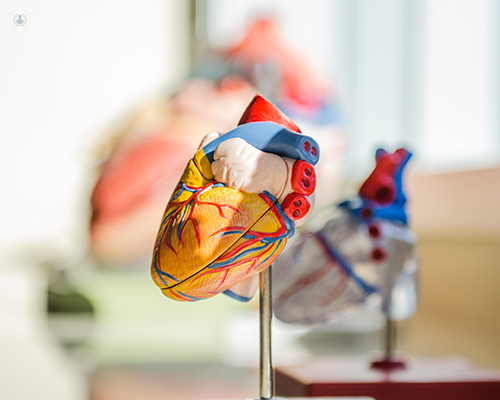Long COVID and the heart: what treatments are available?
Written by:In his latest article, renowned consultant cardiologist Dr Simon Pearse explains how long COVID can affect the heart. He details the different symptoms and some of the possible treatments available.

How does COVID-19 affect the heart?
If you are suffering from a pre-existing cardiovascular disease, for example, high blood pressure, angina, coronary heart disease, or heart failure, or if you are obese or diabetic, the chances of getting a severe illness caused by COVID-19 are much higher.
Patients who require intensive care due to COVID-19 commonly suffer from one of these conditions.
The virus can also affect the heart, both directly and indirectly. In severe cases, it can cause inflammation of the heart muscle or myocarditis. This could be due to the state of inflammation the virus causes in the whole body, or the virus entering into the heart cells.
The COVID-19 virus also increases the risk of heart attacks, as well as the formation of blood clots, especially in the lungs. This can cause a condition called pulmonary embolism.
It can also increase the risk of heart rhythm abnormalities. This usually cause any problems, but it may require emergency treatment in certain cases.
In short, COVID-19 can provoke a number of different heart conditions, which can result in the weakening of the heart muscle and function less well as a pump. However, this happens in only a small number of cases. Most people fake a full recovery from COVID-19.
Can long covid cause any heart problems?
Post-acute COVID, more commonly known as long COVID, is a description of the different symptoms that persist for over a month following infection with the COVID-19 virus.
About half of the people who were hospitalised with COVID still show symptoms a couple of months following the infection.
In people who had a milder bout of COVID, and did not require hospitalisation, about 1 in 10 will still have symptoms after a couple of months.
Long COVID symptoms are more common in people who had pre-existing conditions and in elderly people.
What are the symptoms of Long COVID syndrome?
The most common symptoms include:
- Persistent loss of smell
- Cough
- Fatigue
- Breathlessness
- Chest pain
- Joint pain
- Palpitation
- Dizziness
Any part of the body can be affected by Long COVID, but the lungs and heart are most likely to be affected. If you suffer from symptoms such as breathlessness, palpitations or chest pains, you should see a doctor to determine if there is a problem with your heart.
These symptoms could be caused by ongoing inflammation of the heart due to the infection, irritation of the lungs or blood clots.
It is also possible that a COVID-19 infection could reveal pre-existing coronary heart disease or angina. COVID can also change the way the body automatically regulates heart rate and blood pressure, particularly when standing.

Can Long COVID symptoms be treated?
If you are suffering from any of the symptoms of Long COVID syndrome, you should speak to your GP, or book a consultation with a consultant cardiologist. This especially true if you are suffering from chest pain or breathlessness. These specialists can investigate your symptoms in a number of different ways:
- ECG
- Chest x-ray
- Oxygen saturation in the blood
- Blood pressure and heart rate while lying down and standing
- CT scan of the heart
- Prolonged ECG monitoring
- Blood tests

The treatment will depend on the results of these tests. Possible treatments include:
- Tablet therapy
- Lifestyle modification
- Rehabilitation or exercise classes
New treatments are becoming available every day, as we are learning more and more about COVID every day.
Dr Simon Pearse is a leading consultant cardiologist based in London. If you would like to book a consultation with Mr Pearse, you can do so today via his Top Doctors profile.


